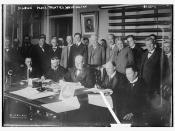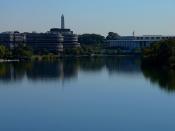Richard D. Brown, ed., Major Problems in the Era of the American revolution 1760-1791 (Lexington, MA D.C. Heath and Company, 1992)
George Washington's concerns about the colonial military were valid. However, they were valid only from the point of view of a late 18th century colonist, or colonial sympathizer. Washington never did cite any examples of wars which other nations had experienced, Based on this principle it is entirely conceivable that he was simply not educated about other global wars. If this is true, then the only references he had for his concerns were the scant previous colonial war history, and his own intuition.
Washington most probably did not have the knowledge of ancient wars in Africa and Asia as aids in helping him decipher his main military concerns. Washington's concerns were actually nothing more than his opinions. Washington's occupational success was dependent on the degree of colonial military success.
The distinguished rank of general automatically made his opinions on his military's weaknesses his gravest concerns.
The idea that a man will not enlist in a militia if the pay scale differs from that of his community, is a valid belief. Washington constructed his concerns from this theory. Washington believed that if the pay for a soldier was low, a man of good virtue would not enlist in the militia. A man had to provide for himself as well as his family, so there would be little chance that he would choose the low wage occupation of fighting for the liberties which higher wage garnering men sought. There had to be more reasons than patriotism to tempt a good man to enlist. 'The officer makes you the same reply, with this further remark, that his pay will not support him, and he cannot ruin himself and family to serve...


